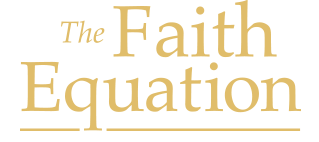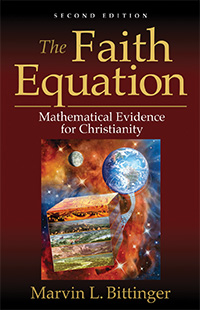My passion and profession is mathematics and my faith is Christian. It is my goal in this book to integrate theology and mathematics as evidence of the Christian faith. A topic is considered only if it can be presented in a framework of mathematics. Because mathematics is the queen or handmaiden of the sciences, there will be inevitable references and examples from science, but in this book mathematics will be in the forefront.
It seems appropriate to answer the question, “What is The Faith Equation?” Skeptics and those with a math background will be quick to ask; I know I would look for the equation and its description the first time I opened the book. A person who becomes a follower of Christ inevitably comes to a faith decision of the mind, the heart, and the will. Thus, I define the faith equation to be
Faith = (Mind) + (Heart)+ (Will).
The faith equation is more allegorical, like a memory device, rather than an equation involving polynomial, exponential, or trigonometric expressions, though these tools are used throughout the book. My mind is engaged with the equation as it gathers evidence for the decision. My heart is engaged in the equation when, despite even some intellectual hurdles, I feel the need for something to fill a void in my life by God or by faith. My heart is involved when I know within me that there is some disconnect that life is not providing an answer for. In short, my heart tells me I hurt, I feel, I need, I long… The will is engaged as I choose to come to faith; that is, to make a leap from the evidence to acceptance. Together, the mind, the heart and the will, lead us to a decision that seems to be unequivocal, accompanied by a commitment and a bias to action to fulfilling the love and hope of the Christian faith.
The focus intent of this book is to use the mind to probe evidence for coming to Christian faith. Evidence is presented primarily in a framework of mathematics, though there is an immense amount of evidence that lies outside this realm.
Numerous theologians, among them Dallas Willard, J. P.Moreland, and William Lane Craig, implore Christians to admit the mind into their faith. Moreland writes in his book Love Your God With All Your Mind, “… how unusual it is for Christian people to be taught how to think carefully and deeply about what they believe and why they believe it. … Judged by the scriptures, church history, and common sense, it is clear that something has gone desperately wrong with our modern understanding of the value of reason and intellectual development for individual discipleship and corporate church life.” For non-Christians Moreland also asserts, “… faith is built on reason. We [non-Christians] should have good reasons for thinking that Christianity is true before we [non-Christians] dedicate ourselves completely to it.” I so support the views of these theologians that I have coined the following as a motto for this book:
God says, “I gave you a brain! Use it my defense! I know I can stand the test!”
Those looking for an extensive and critical interpretation of the Bible and its historicity will not find it in FEQ, though there are wide-ranging references to Biblical topics. Those looking for an in-depth treatment of the philosophical foundations of mathematics will not find it here, nor will they find an axiomatic mathematical system that seeks to “prove” theorems regarding Christianity. What the reader will find is one mathematician’s journey as he enhances his faith by applying mathematics. The journey sometimes takes a story approach as the author intersperses day-to-day spiritual struggles amid situations where mathematics can be brought to bear in defense of the faith. Part of my life as an author of mathematics textbooks is very much like a cat on the prowl looking for applications of mathematics. It was inevitable that mathematics would find its way to my studies of the Bible, theology, and apologetics (defense of the faith).
Millions of people study mathematics in high school and college. The least amount of mathematics needed is a course in college algebra. Even those with less math can grasp the effect of a very large exponent in a denominator, or the intersection of two graphs, or imagine the idea of higher dimensions, and thereby find meaning in the book. In short, it is possible to gather lots of meaningful Christian apologetics in this book by “reading around the math.” In spite of this, there is enough math here to satisfy or entice those blessed with skills of higher mathematics.
In summary, the audience for this book is anyone who seeks to explore the Christian faith and is curious enough to enjoy my expansion of it in a mathematical framework. Excellent books by Stephen Hawking, Brian Greene, Michio Kaku, and Hugh Ross manage to bring what seem like advanced topics such as quantum physics, string theory, and relativity within the grasp of the ordinary reader. My goal in this book is to bring topics like college algebra, probability, statistics and a slight amount of calculus, within the grasp of the ordinary reader in an examination of Christian theology.
Using mathematics as a framework for spiritual insight, the following topics will be considered:
• Paradox and Psycho-Spiritual Growth,
• Probability and prophecy,
• Modeling the Growth of Christian Evangelism,
• The Power of Prayer,
• Higher Dimensions
• Faith Axioms,
• Numerical applications of mathematics in the Bible, and
• Gödel’s Incompleteness Theorem as a metaphor for faith.
The first topic, paradox, is more philosophical as it integrates mathematical logic and theology to create a cornerstone for the rest of the book. Topics like probability and prophecy, modeling growth, and the power of prayer are more analytical making use of concepts from probability and statistics, curve fitting, and statistical analysis. The three chapters on higher dimensions are more metaphorical, requiring the reader to draw on his/her imagination. I invite my reader to join me on a journey of insight into issues of the Christian faith. Bring your mathematical background, your theological knowledge, your Bible, your imagination, and enjoy the ride.
Read an Excerpt:
I have found joy in the belief that God blessed each of us with a wonderful brain and He fully expects us to use it to understand and enhance the Christian faith. It is common religious jargon to say, “God told me that!” While I can’t explain what that means for others, such a statement plays out for me in the form of creative ideas coming to mind that are valid, worthwhile, and unequivocal. In that context, God said to me, “I gave you a brain. Use it in my defense! I know I can stand the test!”
Every mathematician has a streak of philosopher in him. This is seen historically in the lives and works of people like Rene Descartes, Sir Isaac Newton, Blaise Pascal, Johannes Kepler, Bertrand Russell, and Alfred North Whitehead. While these men were not all theists, their work exemplifies mathematicians making connections between philosophy and/or religion and mathematics.
My life has been dedicated to writing mathematics textbooks for college students and, if God has truly blessed me with a talent, it seems to be this. One of my recent goals is to enhance my textbook writing by the inclusion of more applications, a magnificent obsession both unavoidable and heartfelt. No matter what I am involved in, whether it be eating Wendy’s hamburgers, going bowling, playing golf, playing baseball, or sitting in church, I seem to find mathematics. That trend recurred in a most unexpected way, following my heart attack in September of 1998. It is a continuing story.
September 23, 1998 is my heart attack “birthday.” The evening of that day, my precious wife Elaine and I went for a walk. I became aware of a feeling of tightness in my chest. It bore little resemblance to what I thought chest pain should be; it was not like being hit with a baseball bat, or having a cement block placed on my chest. Instead, I seemed to want to push my chest out to relieve the tightness. Nothing more. When we got home the tightness went away.
I went to bed and slept well until I got up about 3:30 AM to go to the bathroom. The chest tightness was now back, but this time I was in a cold sweat. Something was wrong! I woke Elaine and told her that we should drive to the ER. In hindsight, we should have called an ambulance. Being her usual law-abiding self, Elaine was stopping at the red lights. I finally told her to stop, look left and right, and then run the lights. I knew my condition was worsening.
To our amazement when we got to the ER, there were no other patients – I had the attention of all the doctors and nurses. They infused IVs, and connected me to an EKG. Shortly, the doctor patted me on the shoulder and said, “Well, I have bad news, and good news! The bad news is that you are having a heart attack. The good news is that it is on the right side, and that gives you a better chance for recovery.” I looked over at Elaine sitting nearby, pointed my finger up, and she did as well. The unstated implication was that we were both praying.
My life really did flash before my eyes. I thought of all the times I had resisted God’s will, pursued my passions instead of his, and thought I was always going to be in control. My prayer went something like this, “God, you finally have my attention! I know you are in control of whatever happens from here. If you want to take me, I’ll accept that. If you want me to live, it is my preference to stay. I would love to see my grandchildren (at that time none existed)!”
At this time, a certain peace came over me that I can never explain. Elaine commented later that in similar situations, I would normally panic – but not this time. I think it was because I had turned everything over to God. It was not 30 seconds later that I went into cardiac arrest – I coded. I have an absolutely clear memory of that experience, at least until I passed out. I soon returned to consciousness, hearing the doctor casually say, “Well, he is back now.” He had resuscitated me with the defibrillating paddles. I later saw the rectangular burn marks on my chest; even under that stress, I managed to discover some math – I know that may sound bizarre to a non-mathematician. It is a wonder I didn’t take their measurements and compute area and perimeter.
I left the hospital on the 27th of September after receiving two stents for the blocked arteries on the right side of my heart. It was a real blessing to be treated with the stents, instead of undergoing bypass surgery. It is a paradoxical, or ironic, fluke of probability, that I had been exercising for several years, watching my diet fairly well and had even passed a treadmill test with flying colors only five weeks before. My blockage was some combination of bad genetics and poor eating habits from my youth. As I think back, I am not surprised to have clogged arteries considering the meals we ate. I recall eating meals consisting entirely of potatoes fried in bacon grease.
Following my recovery, I asked God what he wanted from me for the rest of my life. It was before my bowling league, when the paradoxical message came through, “Marv, look at all the passions you have had in your life – your sports, bowling, softball, baseball, Purdue University athletics, baseball camps, hiking in Utah, efforts at career advancement, and moving up the academic ladder, all of a self-centered nature. Why don’t you give me the same passion?” I heard the message. It initiated intense reading of the Bible and other theological materials. I had never read the Bible, rebelling against the “Thees, Thous, and thus sayeths” of the King James Version in my youth. Now it was like having a straw in a milkshake of wisdom. I couldn’t slurp up the knowledge fast enough. I read the Bible six times, but from the more readable New Living Translation, or The Message by Eugene Peterson.
I could not believe what I was finding. You have one guess. It has to be – mathematics. Could God give me spiritual wisdom and mathematics at the same time? I couldn’t be that blessed! The first mathematics I saw was frequent references to the number seven. It turns out that the words “seven” or “seventh” are mentioned in the first 21 out of 39 books of the Old Testament. The first occurrence is the second chapter of Genesis, and the last appearance is in the next to last chapter of the New Testament book of Revelation.
Before too long, I had discovered enough applications of mathematics to create a talk I deliver at professional meetings and in math departments of Christian colleges. More research and probing ensued that provided the inspiration for this book.






